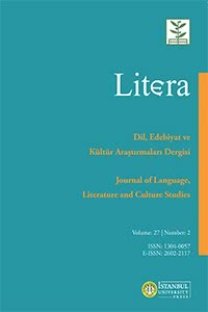NARROW ROAD TO THE DEEP NORTH: BOND'un Şiddet Sorununa Farklı Açıdan Bakışı
Tiyatronun gozde bir sanat dah oldugu donemde oyun yazmaya ba§-layan Bond, 1934 y1lmda i§t;i sm1f1 bir ailenin r;ocugu olarak Londra yakmlannda Holloway' de diinyaya gelir. lkinci Diinya Sava§Int daha r;ok kiit;iik ya§ta kar§ilayan yazar, sava§m neden oldugu deh§eti, korkuyu ve y1- kim1 derinden ya§am1§, Nazi saldmlan nedeniyle iki kez dogdugu yerden aynlmak zorunda kalm1§tlr. Bond, Nazi Almanya'smm ve sava§m neden oldugu korku ve §iddeti belleginden bir tiirlti 91kanp atamam1§tlr. Sava§m sona ermesiyle yeniden Londra'ya donen yazar, egitimine kald1g1 yerden devam eder.
NARROW ROAD TO THE DEEP NORTH: BOND'un Şiddet Sorununa Farklı Açıdan Bakışı
Assist. Prof. Dr. Şevki Kömür: Narrow Road to the Deep North: A Different Perspective to Violence by Bond. Edward Bond was born in 1934 and grown up through the Depression and War against Hitler. His career began at the Royal Court and he went on to write for both left-wing fringe companies and the National Theatre in the 1970s. Bond became increasingly radical and didactic as his popularitygrew in the contemporary British theatre. He writes many plays, analysing causes of contemporary violence and showing its psychological effects. In a sense all Bond's plays are concerned with violence that shapes and obsesses our society. In his plays violence is shown as an instrument and symptom of an unjust society. In Narrow Road to the Deep North, Bond deals with the mechanics of oppression along with the oppressors. The action in the play is distanced as an unhistorical table of an alien country far away from England. A baby is left to a river bank by his poor family, and Basho, who is an idealist, does not help the baby and goes on his quest for Englightenment. The baby who is left to death survives to revenge himself on society, seizing power. Basho, on his way back home from his journey to the Deep North learns that Shogo, the baby he left on the river bank, became a tyrant. He brings in colonial overlords, Commodore and his missionary sister to overthrow Shogo. In this play Bond uses religion and armed force as caricatures of the nineteenth-century imperialism with a British admiral and his missionary sister, Georgina. Bond also depicts the figure of a poet who uses the ab~tract ideals of art to reach his goals and becomes responsible for atrocities in the society. Once again Bond tries to show us what will happen when the power is left to the wrong hands like Shogo, Basho and the others in the play.
___
Bond, Edward (1968) Narrow Road to the Deep North. Methuen, London.Bond, Edward (1972) "An Interview in Critical Quarterly". Vol.26, s. 127.
Coult, Tony (1977) The Plays of Edward Bond, Methuen, London
Eagleton, Terry (1984) Nature and Violence: "The Prefaces of Edward Bond". 26 No:l-2- 127-135.
Elson, John (1976) Post-war British Drama. Routledge and Kegan Paul, London. Hudson, Robert.
Simon Trussler et al ( 1972) "Drama and Dialects of Violence". Theatre Quarterly, 2 No: 5: 5-14.
Nightingale, Benedict ( 1982) 50 Modern British Plays. Heinemann, London.
Saym, Ay~en ( 1989) The Effects of A Violent Culture on Human Beings in Four of Edward Bond's Plays: Saved, Early Morning, Narrow Road to the Deep North and Lear. (Bas1lmam1§ Yiiksek Lisans Tezi, Hacettepe Universitesi, Sosyal Bilimler Enstitiisii).
Scharine, Richard ( 1976) The Plays of Edward Bond. Associated University Press.
Spencer, Jenny S. ( 1992) The Dramatic Strategies in The Plays of Edward Bond. Cambridge University Press.
Sty an, J. L. ( 1981) Modern Drama in Theory and Practice 3: Expressionism and Epic Theatre. Cambridge University Press.
Taylor, John Russel (1982) The Second Wave. Eyre Methuen, London.
Trussler, Simon ( 1981) New Theatre Voices of the Seventies. Eyre Methuen, London.
Yerebakan, tbrahim ( 1993) The Treatment of Class in New Wave of British Theatre: 1956- 1964. (Bas1lmam1§ Doktora Tezi, University of Hull.).
- Yayın Aralığı: Yılda 2 Sayı
- Yayıncı: İstanbul Üniversitesi
Sayıdaki Diğer Makaleler
TOM STOPPARD'IN INDIAN INK OYUNUNDA SÖMÜRGECİLİK VE SONRASI DÖNEME ÖZGÜ YANSIMALAR
ROMALI KADIN ŞAİR SULPICIA VE ELEGIALARININ TOPLUMSAL İÇERİĞİ
TÜRKÇEDE YAZIN ELEŞTiRiSi METiNLERiNE ELEŞTiREL BiR YAKLAŞIM
ANAYURT OTELi'NE YAPIBOZUCU FEMiNiST BiR BAKIŞ
TOPLUMSAL KiMLiK VE KADIN YAZARLIĞI
"WILDE YÜZYILI" BASINDA MAURICE VE TOPLUMSAL CiNSELLİĞİN TANIMI
iKiNCiL SÖZLÜ KÜLTÜR ÜRÜNÜ OLARAK SÖMÜRGECiLiK SONRASI YAZIN ÇEViRiSi
ÇEViRiBiLiM EĞiTiMi: KAPSAMI, AMAÇLARI VE BiR PROGRAM YAPILANMASI ÜZERiNE DÜŞÜNCELER
LORD BYRON YUNANiSTAN'DA: BYRON'UN 19. YÜZYIL ÇAĞDAŞ YUNAN KÜLTÜRÜ ETKİSi
